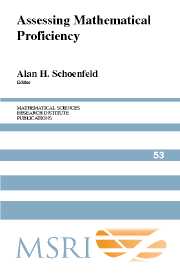Book contents
- Frontmatter
- Contents
- Preface
- Acknowledgments
- Section 1 The Big Picture
- Section 2 Perspectives on Mathematical Proficiency
- Section 3 What Does Assessment Assess? Issues and Examples
- Section 4 The Case of Algebra
- Section 5 What Do Assessments Assess? The Case of Fractions
- 14 Learning About Fractions from Assessment
- 15 Assessing a Student's Mathematical Knowledge by Way of Interview
- 16 Reflections on an Assessment Interview: What a Close Look at Student Understanding Can Reveal
- Section 6 The Importance of Societal Context
- Epilogue: What Do We Need to Know? Items for a Research Agenda
- About the Authors
- Subject Index
- Author Index
- Task Index
16 - Reflections on an Assessment Interview: What a Close Look at Student Understanding Can Reveal
Published online by Cambridge University Press: 06 July 2010
- Frontmatter
- Contents
- Preface
- Acknowledgments
- Section 1 The Big Picture
- Section 2 Perspectives on Mathematical Proficiency
- Section 3 What Does Assessment Assess? Issues and Examples
- Section 4 The Case of Algebra
- Section 5 What Do Assessments Assess? The Case of Fractions
- 14 Learning About Fractions from Assessment
- 15 Assessing a Student's Mathematical Knowledge by Way of Interview
- 16 Reflections on an Assessment Interview: What a Close Look at Student Understanding Can Reveal
- Section 6 The Importance of Societal Context
- Epilogue: What Do We Need to Know? Items for a Research Agenda
- About the Authors
- Subject Index
- Author Index
- Task Index
Summary
This chapter offers a brief introduction to and commentary on some of the issues raised by Deborah Ball's interview with Brandon Peoples, which was transcribed as Chapter 15 and can be seen in its entirety at http://www.msri.org/publications/ln/msri/2004/assessment/section5/1/index.html. The video and its transcript are fascinating, and they reward close watching and reading. What follows in the next few pages barely scratches the surface of the issues they raise.
Before getting down to substance, one must express admiration for both of the participants in the conversation transcribed in Chapter 15. Brandon, a sixth grader, is remarkably poised and articulate. He responds openly and thoughtfully to questioning from Ball on a wide range of issues, in a conversation that is casual but intense—in front of a very large audience of adults! He also shows a great deal of stamina—the interview lasted an hour and a half! Ball demonstrates extraordinary skill in relating to Brandon, and in establishing a climate in which he feels comfortable enough to discuss mathematics in public, and to reveal what he knows. She covers a huge amount of territory with subtlety and skill, examining different aspects of Brandon's knowledge of fractions, revealing connections and confusions, and spontaneously pursuing issues that open up as Brandon reveals what he knows. The interview is a tour de force, demonstrating the potential of such conversations to reveal the kinds of things that students understand.
- Type
- Chapter
- Information
- Assessing Mathematical Proficiency , pp. 269 - 278Publisher: Cambridge University PressPrint publication year: 2007
- 2
- Cited by



